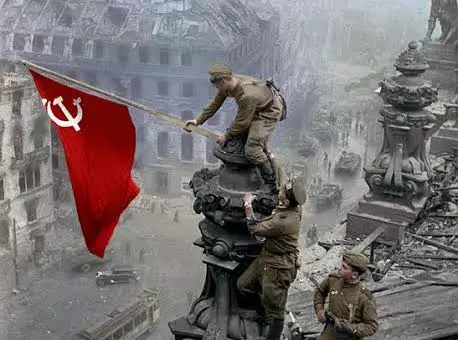There are few terms as quickly and widely reviled in the Western political landscape as “smallpox”, “socialism”, or “the Soviet Union”. With little variation, anybody who speaks of things such as universal healthcare, sustainable development, worker cooperatives, housing the homeless, publicly funded childcare, or any other form of economic rights, is immediately denounced as a socialist, communist, smeared with red and marked for exclusion from polite society. This is especially true in the United States.
The three chosen terms mentioned above have a curious relationship. If it can be shown that socialism played a major role in the disappearance of smallpox, then socialism will have earned a great deal of credit in a world where establishment commentators endlessly trumpet the alleged triumphs of capitalism. Indeed, such is the case. It is worth looking at what humanity would lose if it reflexively abandoned anything associated with a socialist system.
Today’s world is fortunate enough to have forgotten smallpox. If any virus deserved eradication, it was surely smallpox. It afflicted its victims with excruciatingly painful, scabbed sores, killing up to one-third of those infected, and often blinding survivors. Even though the smallpox vaccine had been available since 1796, the World Bank acknowledged that, by the early 1950s, smallpox was killing between 6 million and 8 million people each year. Cumulatively, over the centuries and millennia prior, that number wandered into the hundreds of millions. As Friedrich Engels wrote in another context, “it is like living in the midst of an army just returned from a campaign.” Until the eradication of rinderpest in 2011 (which mainly affects cattle), it was the only disease driven to extinction in human history.
The Soviet struggle against smallpox remains virtually unknown outside of a few academic tomes. Yet, between 1958 and 1980, the Soviet Union was arguably the leading force for the termination of smallpox on the world stage. The World Health Organization’s official history of the Smallpox Eradication Programme, Smallpox and Its Eradication, details the intricacy and magnitude of the Soviet effort with revelatory clarity.
The story began in 1919 when Vladimir Lenin’s Bolshevik government first declared a campaign to eradicate smallpox within Soviet borders. By 1936, the campaign was successful in eliminating smallpox transmission between Soviet citizens, but isolated outbreaks continued due to “importation” from neighbouring, poorer countries that had not yet eliminated the virus, such as Afghanistan. In 1958, Viktor Zhdanov, the USSR’s Deputy Minister of Health, used these examples to propose an international smallpox eradication campaign at the WHO’s annual World Health Assembly.

Zhdanov pointed out that the isolated elimination campaigns of individual countries would not be entirely or lastingly successful, since outbreaks would continue to occur due to the proximity of poor nations that had not yet been able to rid themselves of the disease. To prevent smallpox from being reintroduced, international action was necessary to eradicate smallpox once and for all. The Zhdanov report also identified the proper procedures for vaccine storage, recommended mandatory vaccines at the national level, and outlined proper steps of the eradication process (including surveillance, identification, containment, quarantine, and disinfection).
Further, it was Soviet representatives who first proposed a formal international eradication campaign at each annual World Health Assembly between 1958 and 1967, when the Intensified Smallpox Eradication Programme that overcame smallpox was finally declared. Even still, from 1958 through 1966, the Soviet Union supplied 33 percent of the funding for the WHO Special Account for Smallpox Eradication, more than any other country, and sent 78 percent of vaccine doses received by 1963. Even though the Special Account was a skeleton crew compared to the Intensified SEP, the population living in smallpox-ridden countries declined from 1.7 billion in 1959 to 1.08 billion in 1967, even as the world population grew by 500 million during the same period.
The big picture is even more astounding. Between 1959 and 1984, the Soviet Union contributed 1.7 billion vaccine doses used in international eradication efforts, amounting to 82 percent of the total doses used globally over that time. Of those used strictly in the post-1967 campaign that whittled smallpox down to one case in Merca, Somalia by October 1977, 64 percent were sent by Moscow. Donald A. Henderson, the American doctor and epidemiologist appointed to direct the WHO’S Smallpox Eradication Programme, recalled that “Except for the USSR, no country had production facilities on a scale which would permit contributing more than one or two million doses per year, even if they were so inclined.” Its selfless efforts reflected Karl Marx’s prescriptions that “The working men have no country”, that “It is only possible to achieve liberation in the real world and by employing real means” and that “people cannot be liberated as long as they are unable to obtain food and drink, housing and clothing in adequate quality and quantity.”

The Soviet role was also felt beyond its acute donations and proposals for action. Not wanting to be outdone by Reds, the United States also made its own contributions to the eradication drive. In one memorandum,Joseph A. Califano, the U.S. Secretary for Health, Education and Welfare under President Lyndon B. Johnson, wrote that “two-thirds of the human race lives on less than $100 per year, with a life span of less than 35 years, and besieged by infectious disease. What does this mean for the United States? I leave aside all soft-spoken questions of humanity and brotherhood. I speak only of hard-headed self-interest. The best breeding place for Communism is disease and poverty. If we are going to lead the free world in its fight against the bondage of Communism, we have to do something about the health of these poor people.” Elsewhere in the same document, he added, “What good is any man as an ally if, doubled up by disease, he is unable to rise to his full height and be counted in the militant fight against encroaching Communism?” The United States, for its part, endorsed the Smallpox Eradication Programme in 1967, provided 23 percent of its funding, and donated 192 million doses, or 9 percent of those used in global eradication efforts by 1984. Although inspired and dwarfed by Soviet initiatives and donations, neither act was insignificant.
However, it is clearly unlikely that there would have been either a Smallpox Eradication Programme, whether American, international, or purely scientific, without Soviet prodding. Thus, while the USSR was not the only major force of smallpox eradication, its leadership in the field
drove its capitalist competitors to try and outperform it, if only to avoid embarrassing international capitalism. The United States also welcomed an opportunity to distract the world from its increasingly costly, unpopular and brutal war in Vietnam. The belated entrance of the United States into the Smallpox Eradication Programme shows that without the Red Menace, the White Menace would rarely, if ever, condescend to benefit the many, and then only for self-serving reasons.
Califano’s warning was hardly the first (or last) time the capitalist superpower acknowledged its inferior humanitarian standing relative to its communist rivals. For instance, in a top-secret memorandum from February 1948, the State Department’s Policy Planning Staff lamented, “It is not only possible, but probable, that...many peoples will fall, for varying periods, under the influence of Moscow, whose ideology has a greater lure for such peoples, and probably greater reality, than anything we could oppose to it.”
In sum, Soviet leadership in the battle against smallpox saved, and will continue to save, hundreds of millions of lives. When the effects were not made directly by the USSR itself, they were made by its influence. This lesson should be borne in mind when defenders of the status quo warn that any socially minded, publicly funded, or internationalist policy will meet with inevitable failure.
Of course, nothing said here excuses the many cases of abuse and inefficiency rife throughout Soviet history. The only purpose is to provide a very limited view of the good that can be achieved when the fruits of human labour are channeled towards the public's good rather than private profit. As the political scientist Michael Parenti has written, “...aside from the well-publicized deficiencies and injustices, there were positive features about existing communist systems that were worth preserving, that improved the lives of hundreds of millions of people in meaningful and humanizing ways.” With democratic socialism hopefully emergent this time around, the good will be preserved and the bad will be discarded. One major advantage socialism has over capitalism is that it emerged as a theory before a system, allowing it to be tailored to the circumstances of the working class as needed while remaining focused on the goal of economic democracy.

The moral of this story is that it is not enough to put bandages on the gaping wounds of capitalism’s many social crises, with each country pursuing its own goals in isolation and each citizen pursuing theirs within. Suffering does not recognize borders and must be pursued with vigor across them, pushing international cooperation at the forefront and the comforts of capitalists coming last. For instance, the comparable problem of COVID-19 vaccine apartheid would be solved by now if the Soviet-led approach had been adopted. However, no solution is likely so long as vaccine manufacturers refuse to share information about their products as skin-deep progressives like the Biden administration stand idly by. Even in rich countries, millions of people will continue to pay the price of such active neglect.
And there are many of them, thanks to those who stand to benefit from ignoring or worsening them. In their scorched-earth campaign to gut any policy or public service that minimally resembles any aspect of the communist world, the conservative movement will likely jettison the erasure of smallpox as well. Indeed, the COVID-19 pandemic has pushed opponents of every conceivable public health response to the fore of its ranks. As Texas Lieutenant Governor Dan Patrick stated in April 2020, “Some things are more important than living.”
It is hard to see how this can be true when life is the source of all joys, pleasures, and options, or when the only alternative is to the promise of a second, eternal afterlife to justify privation on earth. To find the meaning (if any) of our lives, they must first exist. If public health is any indication, capitalism does not put the odds in our favor. Socialism does.






